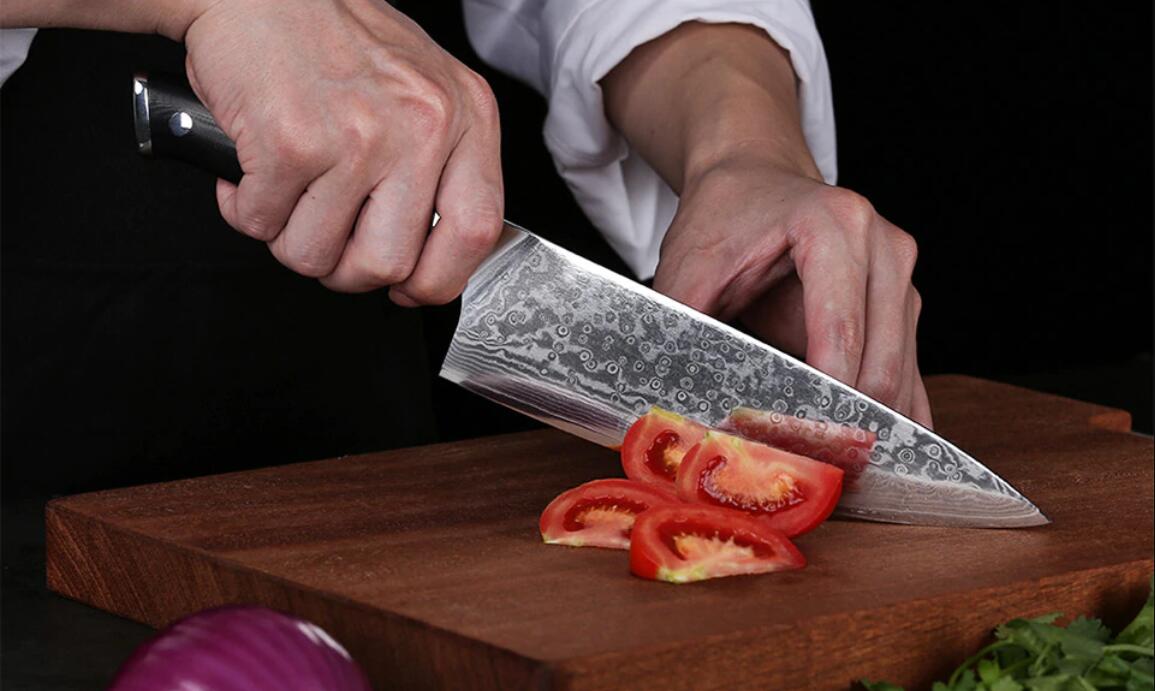When many of your friends recommend Damascus steel kitchen knives to you, you may wonder whether Damascus kitchen knives are really that good? We will show you a series of evidence, to tell you the answer is yes.
If you want to know why, keep reading. and we’ll recommend some Damascus steel kitchen knives as a reference.
Are Damascus steel kitchen knives good? Before answering this question, let's take a look at the factors required for a good kitchen knife.
How to define a good kitchen knife?

As a kitchen knife, its key indicator is naturally sharpness. Presumably the first reaction of most people is the same. It is not difficult to make a knife sharp. As physics knowledge tells us that intensity of pressure = pressure / contact area. Therefore, to make a knife sharp, just make the blade thin enough. Consider with extreme thinking: if the thickness of the blade can be smaller than the cell gap, we can even separate the cells non-destructively; if it is smaller than the molecular gap, it is almost invincible. thus , we can cut ingredients without damage to it’s original cell tissue to keep it’s fresh and original taste.
But the problem is here too. As we all know, the invoices used by the tax bureau is extremely thin in thickness, but it can't cut anything right? — yes, another key indicator of knife quality is hardness!
Hardness not only determines the substance that a knife can cut, but also determines the minimum thickness (ductility) that a knife's blade can reach. The most important thing is that hardness determines how long a knife can maintain It’s sharpness.
Therefore, the first important point of this article is: judging whether a knife is good or not, we should not only look at whether it is sharp when it is received, but also notice how long such sharpness can last. Most kitchen knives are sharp when you receive it, but some begin to become "blunt" shortly after use. The reason is either curling the blade or falling apart. As the name implies, "curled edge" means that the blade is rolled to both sides; "collapse" means that the blade is notched.
It can be seen from this that collapse isn’t a decisive factor in evaluating whether a knife is good or bad, that is, it’s not better if the steel is as hard as possible. the harder the steel is, the easier it will collapse. But after all, hardness is an important indicator for evaluating steel quality.
What’s the key to a good knife?
So, a good kitchen knife should try to find a balance among the opposite factors mentioned above. But does this balance exist? Not necessarily. More often, a so-called balance is achieved according to the different needs of each person. For example, cutting the vegetables does not require the kitchen knife to have a high hardness. It only needs the blade to be thin enough; but when chopping bones, the thinness is so useless.
Most readers have already known what is the key to making a good knife — that is steel! Good steel is the foundation of a good knife.
Are Damascus kitchen knives good?
Damascus steel, origin of ancient India. It refers to steel with a pattern on the surface in current times. In ancient times it was called Uz steel. The "Uz steel ingot" produced in ancient India is the top steel for making swords. Every year, Arab merchants import a large amount of steel ingots to India for weapons manufacturing. When this steel is cast into a sword, there will be a special pattern on the surface-Muhammad pattern, the pattern can make the blade sawtooth microscopically (indistinguishable to the naked eye), making the sword sharper.so the Damascus steel must be a kind of good steel.
The kitchen knife which made by Damascus steel is sharp enough, The HRC (relate to hardness) can up to 60.
So, according to the factors we discussed above, the Damascus steel kitchen knives are definitely a good knife.
Good knife recommendation
Affected by the epidemic, the author recently purchased 2 Damascus kitchen knives at a price of $89.99 and $99 respectively. Just get it, I feel that the details and quality of kitchen knives are good, so I recommend it to everyone, I hope to bring you a reference for the purchase of kitchen knives.
8 INCH JAPANESE DAMASCUS KITCHEN KNIVES
This one is as a gift for my mother.
The mother worked hard in the kitchen for half a life and used only a knife for a long time — only when it broke, she would change it.
A few days ago, my mother helped take care of the children of neighbors.at neighbors’ house, when she was cooking, she used a small kitchen knife. she said casually: "so light and easy to use." So, I felt that it was time to buy a smaller but professional kitchen knife to my mother. I choose this one for my mother.
The kitchen knife is packed in a gift box, which seems a little grand as a gift to the mother.

When open the lid, you can see a layer of black sponge pad which is used for isolation and protection.

Continue unpacking, finally saw the knife itself


The head of the kitchen knife is protected by a plastic sleeve to prevent the user from cutting and protect the tip of the knife.

This model of Damascus steel is very rust-proof and wear-resistant. It is hand-forged and has a hardness of 60. The handle is mirror-polished, so it’s both non-slip and rust-proof.
The brand is LETCASE, which means let cooking a piece of cake. just enjoy your dinner time.
8 INCH FISHBONE PATTERN DAMASCUS KNIFE
This one is for myself.
I no longer show the unpacking process, just look at the knife! Beautiful fish bone pattern, so unique and attractive.

Its Rockwell hardness reaches 60±2, which has already entered the threshold of "hard steel".

The handle of this knife is fixed with three rivets, one of which is a gilt mosaic nail, it has strong sense of retro, a special fashion.

The workmanship between the knife handle and the knife body is delicate and burr-free.


The handle material of this Damascus kitchen knives is G10.
G10 is a composite material composed of glass fiber cloth and epoxy resin. It was originally developed as a material for aircraft and can withstand great forces without destroying deformation. G10 will not be penetrated by water vapor and liquid, and has the characteristics of insulation, acid and alkali resistance, and it is not heavy.
A good knife with a good handle. Such material characteristics ensure that the cutter can be used for a long time without being corroded in a humid (water) and high electrolyte (salt) environment.
Conclusion
Do you have some basic understanding of kitchen knife when you read here?
Good steel gradually increases it’s hardness. From the perspective of carbon content, 1% is a critical value. If the carbon content is higher than 1%, one foot will step into the "hard steel" rank; from the hardness point of view, the Rockwell hardness 60 is a critical value. Above 60, it can be called "hard steel".
Generally, cheap stainless steel kitchen knives, the price ranges from $19.99 to $29.99, usually use 3Cr13 with 0.3% carbon, 13% chromium, the HRC hardness is about 51-52. (Heat treatment has a greater impact, only the general case) for some better chef knives use 4Cr13, 5Cr13the carbon content is slightly improved, and because it is made by large factory, the heat treatment is more reliable, and some series also add a small amount of molybdenum Mo and vanadium V to make it’s performance better, the hardness can reach 54.
Further better kitchen knives is the German brands such as Zwilling, using Din 1.4116, containing 0.5% carbon and 15% chromium, and molybdenum and vanadium, It’s anti-rust and wear-resistant, the original German steel was processed by the original cryogenic treatment, the HRC can reach 57.
Further better kitchen knives use 9Cr15Mov, containing 0.9% carbon, or 813 steel with three-edged wood, containing 0.8% carbon. The hardness of these two high-carbon steels can reach 58-59, generally not as high as 60, because That would be too brittle.
Further better is one of Damascus steel — VG10, with carbon content of 1%, chromium 17%, plus the addition of cobalt, molybdenum, vanadium and other elements, the hardness can easily exceed60, and even up to 62 which can make the kitchen knives performance well in sharpness. (Very few high-quality powdered steels, such as ZDP189, will have higher hardness. For example, the Cermax series of Zwilling kitchen knives use ZDP189, with an HRC hardness of 66, which is amazing.)
So, don’t doubt that the Damascus steel kitchen knives are good knives.
After mastering these basic knowledge about steel, next time when you see articles or advertisements about recommendation of kitchen knives, you will no longer have to leave a message in the comment area to ask others "how is this knife?", you just look at the parameters yourself, you are professional.


0 comments